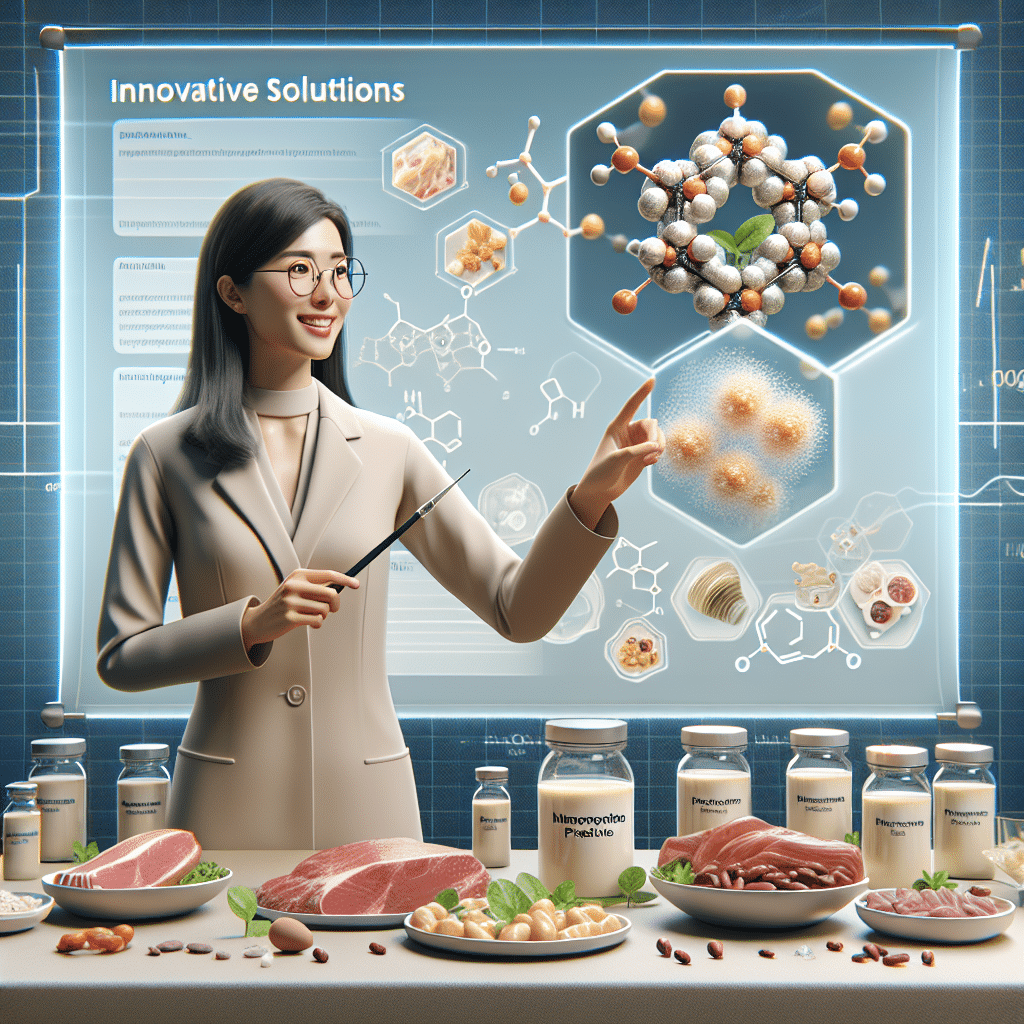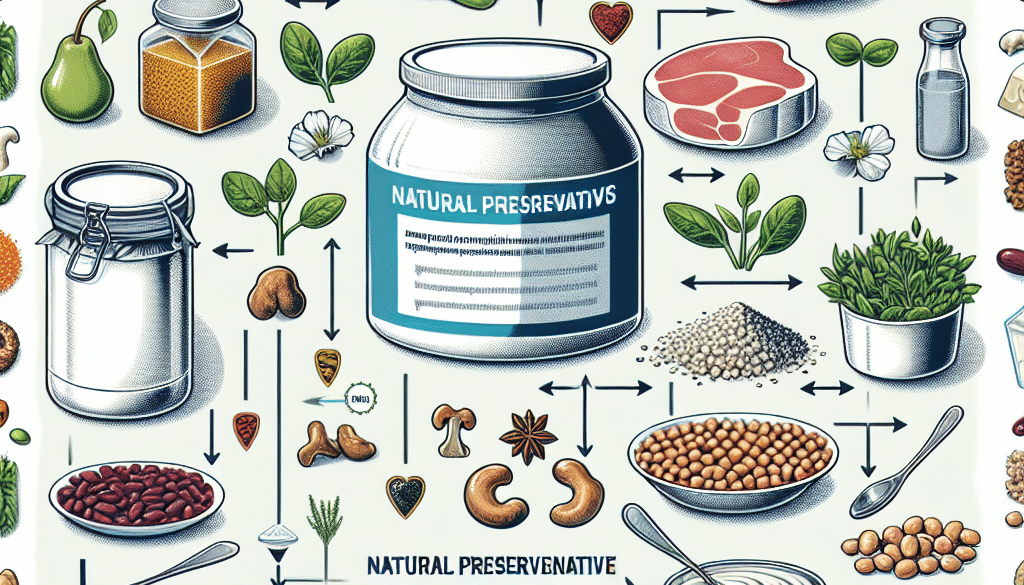Natural Preservatives in High-Protein Foods: Innovative Solutions
-
Table of Contents
- Natural Preservatives in High-Protein Foods: Harnessing Innovation
- The Need for Natural Preservatives in High-Protein Foods
- Exploring Natural Preservative Options
- Case Studies and Research Findings
- Innovative Techniques in Natural Preservation
- Regulatory Considerations and Consumer Acceptance
- Challenges and Future Directions
- Conclusion: Embracing Nature’s Preserving Power
- Discover ETprotein’s High-Quality Protein Products
Natural Preservatives in High-Protein Foods: Harnessing Innovation

High-protein foods are a staple in the diets of health-conscious individuals and athletes alike. However, preserving these nutrient-dense foods without compromising their quality or safety is a significant challenge for the food industry. Traditional preservatives often come with health concerns, leading to a growing demand for natural alternatives. This article explores innovative solutions in the realm of natural preservatives for high-protein foods, offering insights into the latest trends and research.
The Need for Natural Preservatives in High-Protein Foods
Protein-rich foods are particularly susceptible to spoilage due to their nutrient content, which provides an ideal environment for microbial growth. The use of chemical preservatives has been the norm, but their potential health risks have raised consumer concerns. Natural preservatives offer a safer alternative, capable of extending shelf life while maintaining the integrity of high-protein foods.
Exploring Natural Preservative Options
Several natural substances have been identified as effective preservatives for high-protein foods. These include:
- Plant extracts: such as rosemary, oregano, and green tea, which have antioxidant and antimicrobial properties.
- Essential oils: like thyme, clove, and cinnamon oil, known for their strong antimicrobial effects.
- Fermented products: such as nisin, a polypeptide produced by Lactococcus lactis, which inhibits a wide range of bacteria.
- Vinegar and citric acid: common food-grade acids that lower pH and inhibit microbial growth.
These natural preservatives not only extend the shelf life of high-protein foods but also contribute to their flavor profile and nutritional value.
Case Studies and Research Findings
Recent studies have highlighted the effectiveness of natural preservatives in high-protein foods. For instance, a study published in the Journal of Food Science demonstrated that rosemary extract could significantly reduce the oxidation of meat proteins, thereby preserving their quality. Another research project found that nisin effectively controlled Listeria monocytogenes in ready-to-eat meat products.
These findings underscore the potential of natural preservatives to replace synthetic additives in high-protein foods, ensuring safety and quality without adverse health effects.
Innovative Techniques in Natural Preservation
Advancements in food technology have led to innovative methods of applying natural preservatives, such as:
- Microencapsulation: which protects the preservative’s active components and allows for controlled release.
- High-pressure processing: a non-thermal method that inactivates pathogens while preserving the food’s nutritional and sensory qualities.
- Hurdle technology: combining multiple preservation techniques to achieve a synergistic effect.
These cutting-edge approaches enhance the efficacy of natural preservatives, making them more attractive for use in high-protein foods.
Regulatory Considerations and Consumer Acceptance
Regulatory bodies, such as the FDA and EFSA, have stringent guidelines for food preservatives. Natural preservatives often have a better chance of meeting these regulations due to their lower toxicity profiles. Moreover, consumer preference for “clean label” products has driven the adoption of natural preservatives in the food industry.
Challenges and Future Directions
Despite their benefits, natural preservatives face challenges such as variability in efficacy and potential for flavor changes in the food product. Ongoing research is focused on overcoming these hurdles and discovering new natural compounds with preservative properties.
The future of natural preservatives in high-protein foods looks promising, with a continuous push towards more sustainable and health-conscious food production practices.
Conclusion: Embracing Nature’s Preserving Power
Natural preservatives are revolutionizing the way we maintain the freshness and safety of high-protein foods. With ongoing research and technological advancements, these innovative solutions are set to become the new standard in food preservation. By harnessing the power of nature, we can provide consumers with high-quality, safe, and nutritious protein-rich foods that align with their health and environmental values.
Discover ETprotein’s High-Quality Protein Products
If you’re in search of premium protein products that align with the latest trends in natural preservation, look no further than ETprotein. Their extensive range of organic and plant-based proteins, including organic rice protein, clear pea protein, and pumpkin seed protein, are produced with the highest standards of quality and safety in mind.
ETprotein’s commitment to non-GMO, allergen-free ingredients ensures that their products meet the needs of health-conscious consumers and industry professionals alike. Whether you’re formulating new food products or seeking to enhance your current offerings, ETprotein provides the solutions you need to succeed in today’s competitive market.
About ETprotein:
ETprotein, a reputable protein Chinese factory manufacturer and supplier, is renowned for producing, stocking, exporting, and delivering the highest quality organic bulk vegan protein and plant proteins. They include Organic rice protein, clear rice protein, pea protein, clear pea protein, pumpkin seed protein, sunflower seed protein, mung bean protein, peanut protein etc. Their offerings, characterized by a neutral taste, non-GMO, allergen-free attributes, cater to a diverse range of industries. They serve nutraceutical, pharmaceutical, cosmeceutical, veterinary, as well as food and beverage finished product distributors, traders, and manufacturers across Europe, USA, Canada, Australia, Thailand, Japan, Korea, Brazil, and Chile, among others.
ETprotein specialization includes exporting and delivering tailor-made protein powder and finished nutritional supplements. Their extensive product range covers sectors like Food and Beverage, Sports Nutrition, Weight Management, Dietary Supplements, Health and Wellness Products, and Infant Formula, ensuring comprehensive solutions to meet all your protein needs.
As a trusted company by leading global food and beverage brands and Fortune 500 companies, ETprotein reinforces China’s reputation in the global arena. For more information or to sample their products, please contact them and email sales(at)ETprotein.com today.














